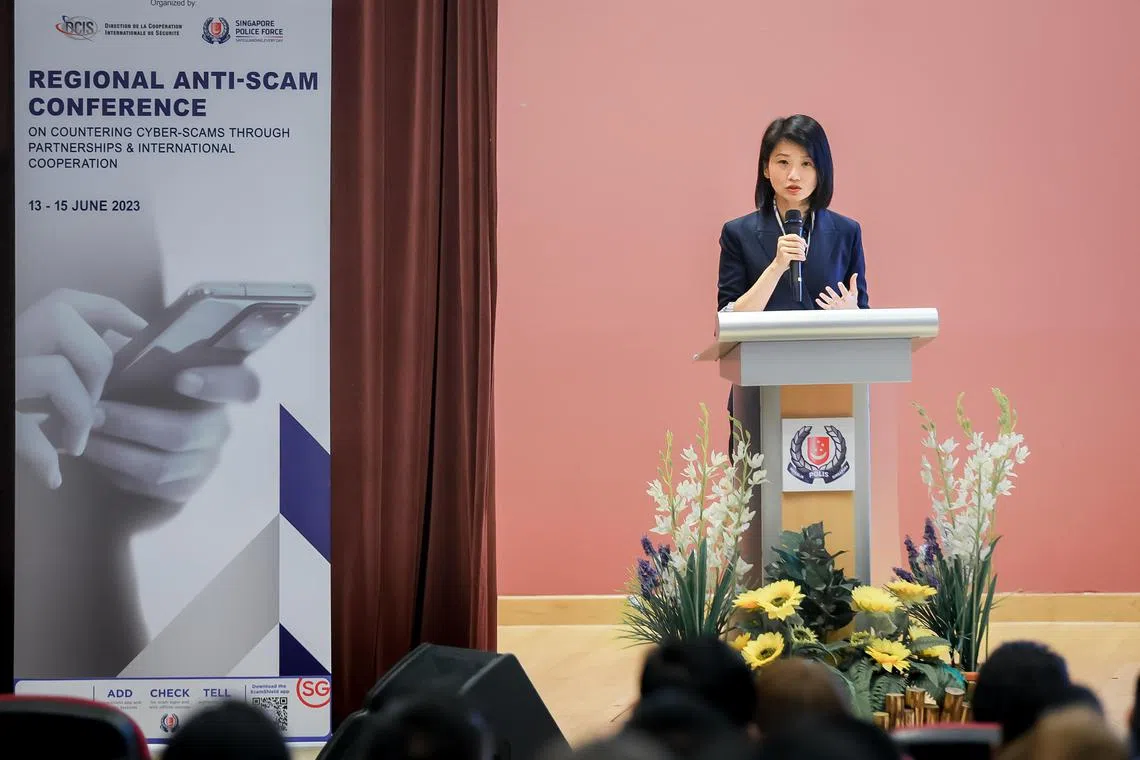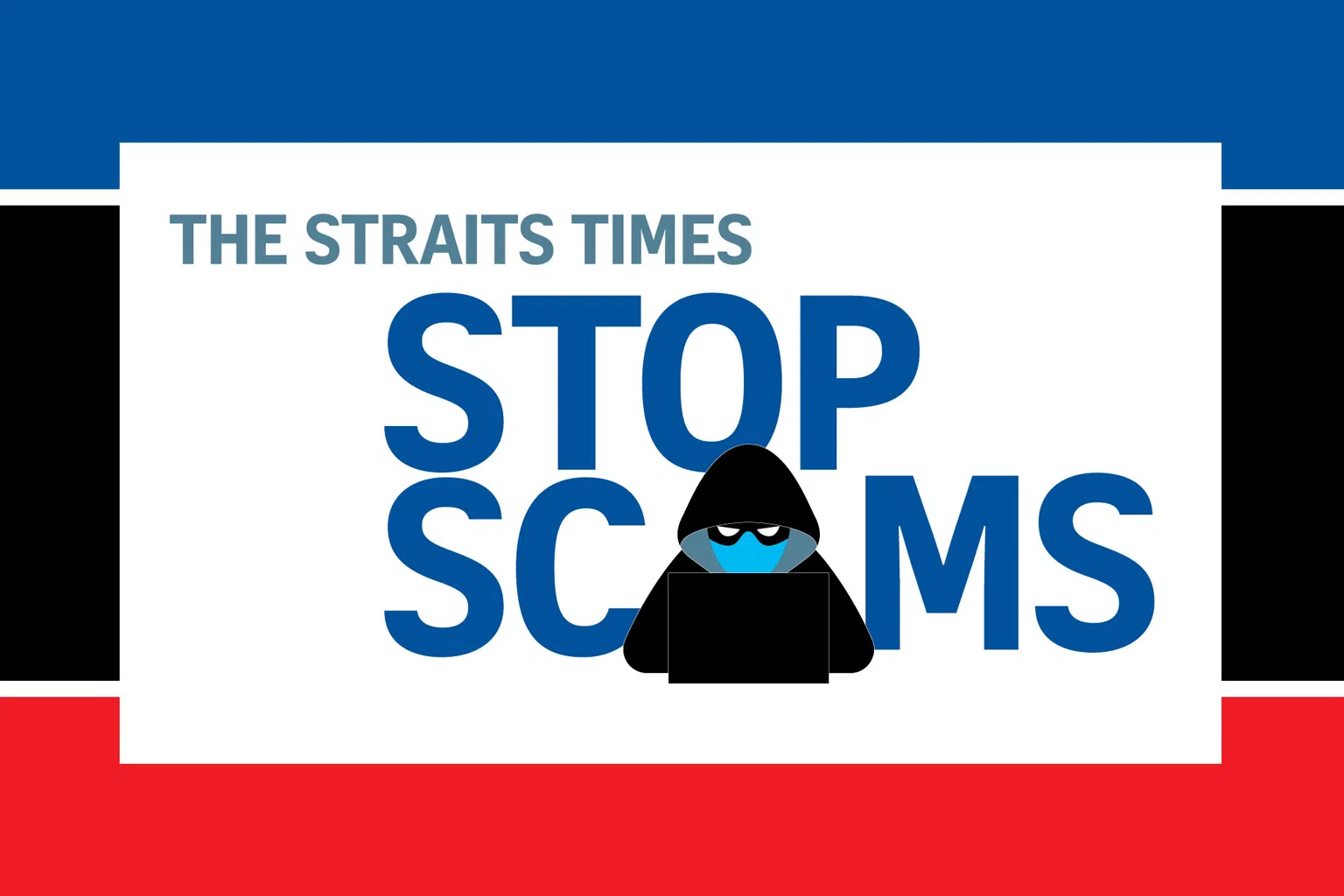International cooperation needed to take fight to scammers: Sun Xueling
Sign up now: Get ST's newsletters delivered to your inbox

Minister of State for Home Affairs Sun Xueling said once scam proceeds are transferred across borders, enforcement becomes extremely difficult.
ST PHOTO: GAVIN FOO
Follow topic:
SINGAPORE – Anti-scam outfits should be established in different countries to fight transnational scam syndicates and recover proceeds that have been transferred across borders.
Speaking at the opening of the Regional Anti-Scam Conference 2023 at the Police Cantonment Complex on Tuesday, Minister of State for Home Affairs Sun Xueling said once scam proceeds are transferred across borders, enforcement becomes extremely difficult.
“If, however, every country has the equivalent of an anti-scam command outfit, whereby prompt intervention efforts can be taken to quickly trace the flow of incoming scam proceeds, and swiftly freeze the bank accounts of the scammers, then our collective efforts to recovering the scam proceeds will be greatly enhanced,” she said, adding that Singapore set up its Anti-Scam Command in 2022.
Ms Sun said such outfits can work with their foreign counterparts by sharing information, coordinating cross-border tracing of funds and freezing of scam-tainted bank accounts.
“Even if we cannot recover the scammed monies in full, we can make it as difficult as possible for scammers to carry out their scams.
“By freezing these bank accounts, we are depriving the scammers of the opportunity to utilise these scam proceeds to launder them, to have them circulated in the system, to continue for them to multiply their operations,” she added.
The conference is being held from Tuesday to Thursday.
Organised by the Singapore Police Force (SPF) in partnership with the International Security Cooperation Directorate of the French Embassy in Singapore, the event sees representatives from at least 15 countries in attendance, including those from Indonesia, Malaysia, France, Australia and the United States.
Other law enforcement organisations at the conference include Interpol and Aseanapol.
Scams became a crime of concern for Singapore in 2016, when more than 5,300 cases were reported that year.
In 2022, there were more than 31,000 reported cases, with victims losing in excess of $660.7 million.
The top three scam types here in 2022 were phishing, job and e-commerce scams in terms of victims, and investment, job and government official impersonation scams in terms of money lost.
Citing figures from the Global Anti Scam Alliance, Ms Sun noted that around US$55.3 billion (S$74.2 billion) was lost to scams worldwide in 2021.
She said that given the organised and transnational nature of scams, and their massive scale, governments must collaborate with their international counterparts to achieve maximum impact.
Such collaborations in the past between SPF and overseas law enforcement agencies resulted in the takedown of six job scam syndicates, three government officials impersonation scam syndicates, two phishing scam syndicates and two Internet love scam syndicates.
“More than 70 persons based overseas, who were responsible for more than 280 scam cases, were arrested,” added Ms Sun.
Describing the methods employed by scam syndicates as brutal, she said the damage extends far beyond financial losses and emotional trauma and has, in some cases, cost victims their lives.
Interpol last Wednesday warned that scam syndicates are also contributing to a “global human trafficking crisis”.
It issued an Orange Notice to its 195 member countries, saying tens of thousands of people have been lured to criminal hubs in South-east Asia through fake job offers posted by scam syndicates in large-scale human trafficking schemes.
In her speech, Ms Sun also called for international norms to be established, including baseline standards for the different industry stakeholders, such as telecommunications companies, online platforms and financial institutions.
These standards are to encourage each stakeholder to play its proper part in the fight against scams.
She said the Ministry of Home Affairs in Singapore worked with industry stakeholders in 2021 to revise guidelines for e-commerce transactions.
“These guidelines include encouraging e-retailers and online intermediaries to adopt measures that enhance merchant authenticity, improve transaction security and aid enforcement against scams,” added Ms Sun.
But scammers are adopting new strategies, such as the use of technologies including artificial intelligence (AI) and deepfakes. to impersonate family members of potential victims.
Experts warn that such technologies can be abused by scammers to create convincing deepfakes, making it even more difficult for victims to distinguish between a loved one and a bad actor.
To monitor these threats and develop ways to counter them, Ms Sun said that law enforcement agencies will need to work with research institutes, relevant government agencies and market players.
In a media release about the event, SPF noted that strong partnerships across borders have produced results.
“The strong public-private partnerships, interventions and close collaborations which SPF enjoys with our foreign law enforcement counterparts, such as the Royal Malaysia Police and Interpol, have greatly allowed us to exchange information and conduct joint investigations and operations against transnational scams,” said Commercial Affairs Department director David Chew.
“Over the past two years, the SPF has worked closely with foreign partners to bust 37 transnational scam syndicates, leading to the arrests of more than 330 syndicate members.”



